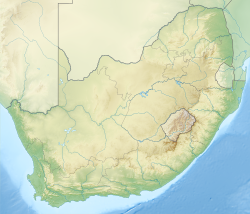| Riet River | |
|---|---|
| Etymology | From the word for "reed" in the Afrikaans language |
| Location | |
| Country | South Africa |
| Province | Western Cape |
| Physical characteristics | |
| Source | |
| • location | Koue Bokkeveld |
| Source confluence | Winkelhaak / Houdenbeks |
| • coordinates | 33°09′30″S19°26′06″E / 33.15833°S 19.43500°E |
| • elevation | 971 m (3,186 ft) |
| Mouth | Doring River |
• location | De Mond |
• coordinates | 32°30′47″S19°33′18″E / 32.51306°S 19.55500°E |
• elevation | 392 m (1,286 ft) |
The Riet River (Afrikaans : Rietrivier) is a river in the Western Cape Province, South Africa. It is part of the Olifants/Doring River system. [1]
